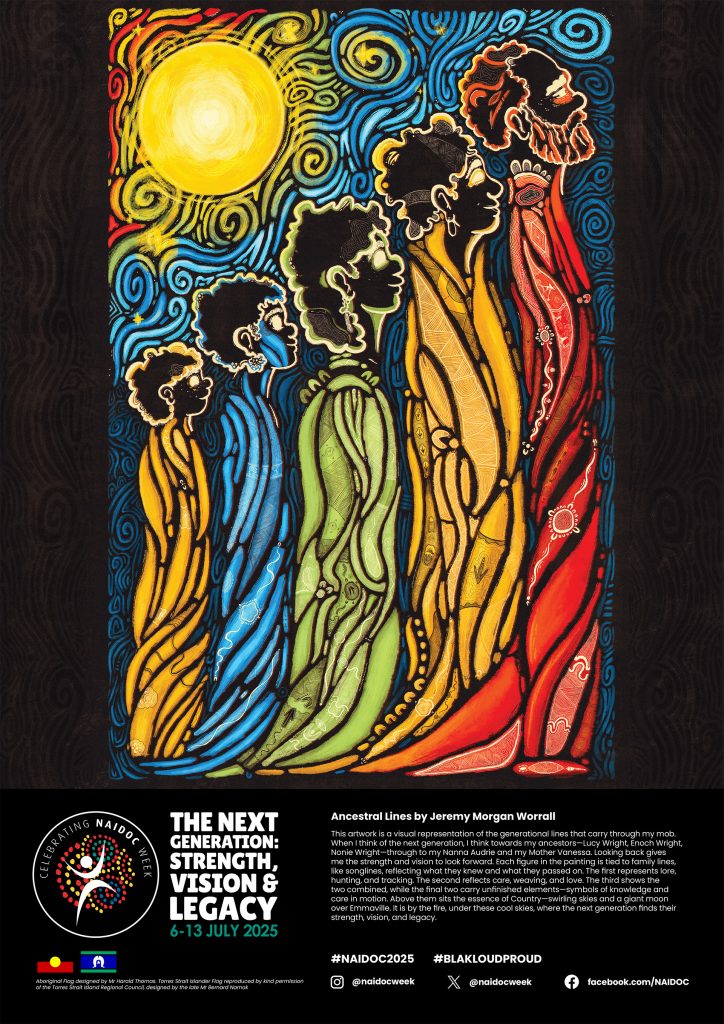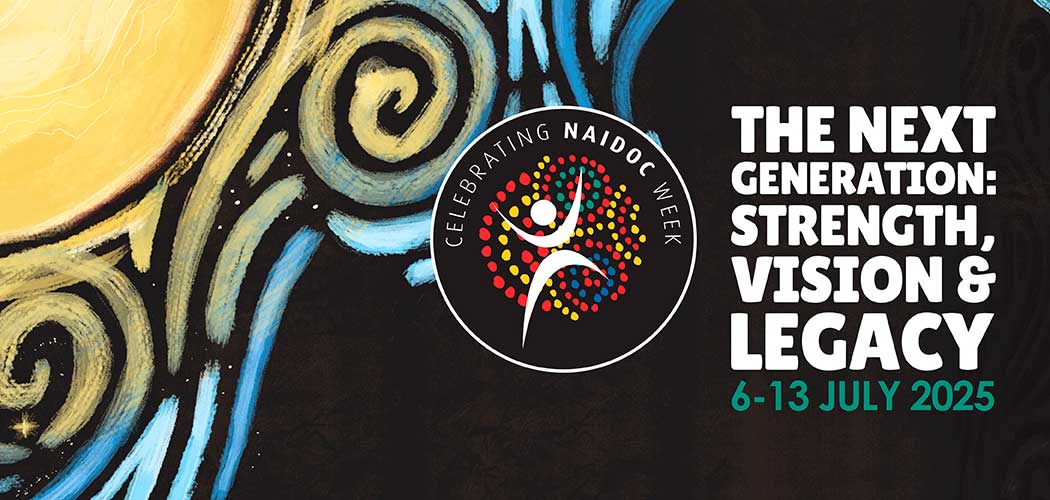This year, NAIDOC Week, held during 6-13 July, marks a powerful milestone: 50 years of honouring and elevating Indigenous voices, culture, and resilience.
Each year during NAIDOC Week everyone is invited to celebrate the histories, cultures and achievements of Aboriginal and Torres Strait Islander people.
The 2025 NAIDOC Week theme, The Next Generation: Strength, Vision & Legacy, celebrates not only the achievements of the past but the bright future ahead, empowered by the strength of Indigenous young leaders, the vision of communities, and the legacy of ancestors.
In an online yarning webinar, role models from Red Dust discuss the 2025 theme inviting all Australians to listen, learn, and engage in meaningful dialogue about reclaiming narratives, amplifying voices and committing to justice and equality for all.
Red Dust Programs Director Jonathan Lindsay-Tjapaltjarri Hermawan is joined by language teacher Kira and former athlete Kirby. Panellists highlight the need for education, and understanding of Indigenous cultures, urging non-Indigenous people to engage with and learn from First Nations communities to foster inclusivity and challenge existing societal norms.

“The beauty of NAIDOC is that it sets aside that period of time where we can celebrate the strengths of First Nations cultures and voices – hearing from the strength of women in our communities and our partners and our friends and our colleagues and our family members,” said Jonathan.
“I would love NAIDOC to be all year, not just NAIDOC week and I’d like it even more so where NAIDOC isn’t even said, it’s just that we celebrate First Nations cultures across the board and we embrace what that means for us as a nation, because it’s the foundation of the spirit of this country, of the earth that exists within it, the physical country as well as our hope for what it means to really be reconciled.”
Shifting the narrative
This year, the National NAIDOC Committee has taken an important step toward independence, embracing self-determination as a model for the next generation.
Part of the challenge is smashing the narrative of suffering, of disadvantage, of dysfunction of Aboriginal and Torres Strait Islander peoples.
“It’s the extra and the supportive mechanisms that we’ve failed to put in place for our young people and the narrative of suffering, disadvantage and low expectation, that really has been that ceiling that we have to break through,” said Jonathon.
“The sad truth is that if you only look at the deficit, you’ll never see the strengths, you’ll never see the constructs of hope and of joy and of dignity and of aspiration.
“If we can smash that and highlight the incredible achievements of our mob, that’s what our kids can look at and say, ‘I can achieve because uncle or dad has been able to do that and he’s telling me that I can, not that I can’t’. That’s really significant for a lot of young people.
“Through social media, a lot of our people are speaking out, to see a different perspective, which then shifts the narratives. It’s about building and empowering and shifting the vision,” said Jonathan.
Cultural identity
Red Dust provides intergenerational programs aimed at promoting health, education and cultural identity.
“The first thing is aspiring to dream big, dreaming big for you and for your mob, not only for your community, but for the nation as a whole, it’s an aspiration.
“It’s about getting back to who we are, where we come from, and realising that that is so significant in not only shaping your value system and how you view yourself but shaping that understanding of where you belong and all of the strengths around that – all of the mechanisms that support you to be healthy and strong. Before you realise that you’re going down the wrong path is realising your sense of identity and who you are as a person is critical to that,” said Jonathan.
Former athlete Kirby who has now moved into the corporate world, said strength lay in cultural identity.
“The strength for me is breaking those shackles to become the best of the worlds we live in and not at the expense of our culture and where we come from.
“We often need to fit into a mould that’s not created for us to exist in our true identity. I feel like it’s changing and there’s more acceptance. We can exist in our true selves and who we are to have the same opportunities.
“I think we’ve always had that strength and I feel like now because of our uncles and aunties and our older brothers and sisters, we’re able to walk in that with a different sense of pride and empowerment and to own it, which is a really different space for us.”
Each NAIDOC Week reinforces a vision for an Australia where Indigenous voices are not only heard but lead the way.
Call to action for non-Indigenous allies
Education is key, said Kira, who calls on all Australians to become fully aware and informed about the history of this nation.
“Learning the truth about our history and talking to our people and understanding from their perspective when things come up that is controversial, like invasion day for example.
“If you don’t know a lot about that, learn and understand both sides and then you can make a choice of where you sit with that. Engage and educate yourself and own that.
“Our history is an uncomfortable truth, but only we can change it moving forward by having conversations and knowing the real facts. We need people to walk with us.”
To get involved in local events during NAIDOC Week, visit the NAIDOC website.








